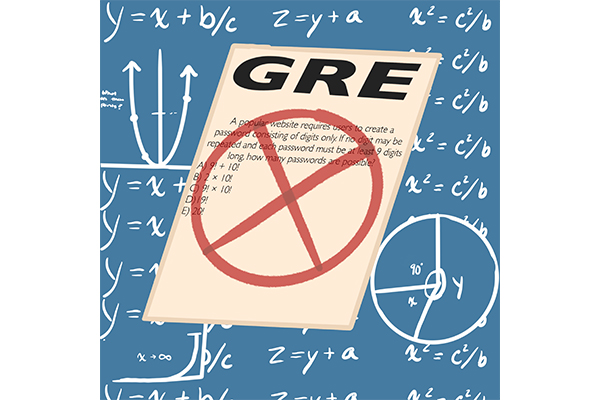Some university graduate programs will waive standardized testing requirements for admissions starting next summer in response to difficulties accessing tests due to the COVID-19 pandemic.
Thirty out of more than a hundred graduate programs at UT have waived the Graduate Records Examination, or GRE, which tests analytical writing, quantitative reasoning and verbal reasoning, said Nicolas Hundley, director of communications for the UT Graduate School. Some graduate programs are pushing to remove the GRE requirement permanently, astronomy associate professor Mike Boylan-Kolchin said.
The astronomy department at UT is one of the programs that waived the GRE requirement for this year.
“Performance in the GRE isn’t necessarily reflective of the underlying knowledge that we’re hoping to test,” Boylan-Kolchin said. “At best, there is a weak correlation between GRE scores and success in grad school, and in a lot of cases there is no correlation.”
Even prior to the pandemic, the GRE was a barrier between low-income students and graduate school, said Nohely Guzman, Latin American studies graduate student. The test costs $205 to take, and students can take it up to five times within a 365-day period, according to the GRE website.
“I remember reading a blog that said ‘Don’t worry, no one does well the first time they take the test,’ and I can’t take this test several times because it’s so expensive,” Guzman said.
Guzman, an international student, said the test also assumes students understand America’s cultural norms. She said when she was studying for the test, one question asked about nickels and dimes, which she didn’t understand because she grew up in Bolivia.
“It’s not only putting the underprivileged portion of the population under more stress and more pressure but also it’s already segregating them,” Guzman said. “It’s depriving them from the opportunity because it’s so discouraging if you get a low score, especially when (you’re from) the same communities that have been segregated and marginalized historically speaking.”
The computer science department also waived the requirement for spring, summer and fall 2021 and spring 2022. Don Fussell, computer science department chair and professor, said the test’s cost could put a significant strain on students.
“Can you imagine spending $1,000 to take (the GRE) multiple times over again when you really don’t have $1,000?” Fussell said. “It is well-understood that it has biases, and I think it is well-understood that academia in general has probably been overly reliant on it.”
Whether or not the GRE provides any useful metric for determining admissions is still debated, Fussel said. The computer science department is still discussing whether they will petition to waive the GRE in the future.
The School of Journalism in the Moody College of Communication is one of the schools that have not waived the GRE requirement. Journalism graduate student Christopher Assaf said the GRE does not do a great job of showing a person’s academic scholarship, and it could be intimidating to students applying to graduate school.
“I’ve been in hurricanes, I’ve been in protests, I’ve done many intimidating things, but this stupid little test, I was really nervous about,” Assaf said. “So I can see how it can intimidate people, particularly those that are not very good at taking tests, and that could definitely keep people from applying to graduate school.”





















